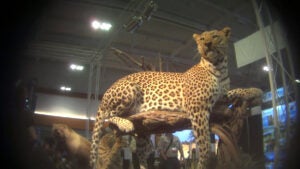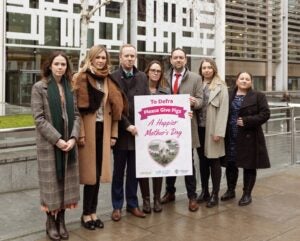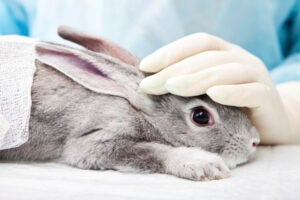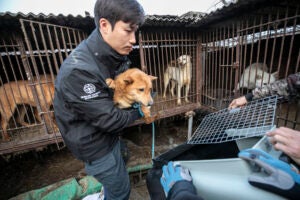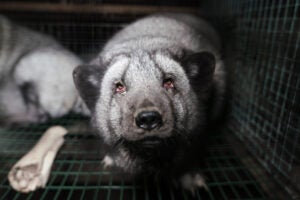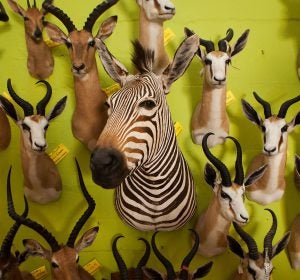
MADRID—Humane Society International/Europe found that at least 54 outfitters at one of EU’s largest hunting fairs, Cinegética, were selling trophy hunts for internationally protected species.
Trophy hunters and industry gathered at the fair in Madrid to congratulate each other and brag about another year of conquests, including the trophy hunting of threatened and endangered species like addax, rhinoceros and leopards, and to increase sales for the deaths of hundreds of additional animals for entertainment. From March 23 through 26, foreign and domestic outfitters promoted special deals and luxury vacations to kill some of our world’s most important and imperiled wildlife; flouting the global biodiversity crisis to which direct exploitation of organisms, such as poorly managed trophy hunting, is the second largest contributor.
The species whose lives were offered up for sale include polar bears, lions, African elephants and leopards wrapped up in special holiday packages offered at relatively low prices, like 900 euros for a giraffe and 4,500 euros for a hunt to kill a female lion—including international flights and 7-day accommodations. Other emblematic species like elephants or rhinos were assigned heftier price tags given their rarity and high demand—as much as 24,500 euros and 60,000 euros respectively.
Special packs were on offer with additional animals, such as jackals or warthogs, included for free as extra perks or to serve as bait for hunting larger carnivores. Numerous trophies from different species like giraffe, African lion, brown/black bear and also polar bear were on display to drive demand for these rare and iconic species and to celebrate the hunters at the forefront of this destructive industry.
The event also served as the backdrop for the signing of the first transatlantic agreement between Safari Club International and Cinegética to further advance the trophy hunting industry’s objectives. This newly founded “largest alliance to promote hunters’ way of life,” and the claim “first for hunters” shows their intention to remove or block any obstacles to hunting activity, including much needed legal and regulatory protections for threatened and endangered wildlife.
In addition to sales and promotions, the Cinegética also served as an awards show for best foreign hunting trophies. Gold, silver and bronze medals were awarded to hunters for “achievements” in killing animals in Africa, America, Asia and Europe. Victims of the winners included CITES-listed species, like cougar and black bear.
An award was also handed out in a special category for trophies hunted with bow and arrow—a practice that is strongly criticised. Studies show that its use may result in a 50% wounding rate (animals injured, but not killed), suggesting that this method is far from being a clean kill and inflicts tremendous suffering to the target animal1. There was also one special award “Premio Nikon” sponsored and owned by camera and lens manufacturer Nikon, to the overall best trophy, a blue sheep (Pseudois nayaur), of which Spain is the biggest importer in the EU.
Dr. Joanna Swabe, senior director of public affairs for Humane Society International/Europe, said: “It is shocking to see that Cinegética is giving a promotional platform to the trophy hunting industry and dedicating large parts of the fair to the senseless slaughter of endangered wildlife. Immediate action must be taken to halt the promotion of trophy hunting at this fair”.
The vast majority (89%) of Spanish citizens clearly oppose the trophy hunting of internationally protected species. Overall, 84% support legislative change to ban the import of hunting trophies from threatened and endangered species to Spain.
Background:
- Spain is the second largest importer, after Germany, of hunting trophies from mammal species listed under CITES. Between 2014 and 2020, Spain imported at least 3,208 hunting trophies from 56 different CITES-listed mammal species. The top five imported species were Hartmann’s mountain zebra (267), chacma baboon (256), lion (255), African elephant (220) and Siberian ibex (197). Spain also imported species that are classified as extinct in the wild by the IUCN, like Scimitar oryx and Arabian oryx. Furthermore, eight polar bears, one black rhinoceros, which is classified as Critically Endangered, and one tiger were imported as trophies from hunts. The numbers of imported species to Spain show that there is a steady increase during this time span of more than 50%, from 367 imported trophies in 2014 to 552 in 2020.
- Other European countries, such as the Netherlands, Belgium, France and the UK, have banned or are in the process of banning the imports of hunting trophies of endangered and threatened species.
- In Spain, the Parliamentary Association for the Defense of Animal Rights held an event last year for International Wildlife Day where international experts explained the risks and dangers that trophy hunting has for endangered and threatened species. At the event, the Associations’ MP presented a Parliamentary initiative calling for a ban on hunting trophy imports of species listed in Annex A and seven species from Annex B (polar bear, African elephant, African lion, argali, hippopotamus, white rhino and the giraffe) of the EU Wildlife Trade Regulations.
Note to editor:
[1] Ditchkoff, S., Welch, E., Lochmiller, R. L., Masters, R. E., Starry, W. R., Dinkines, & Lincoln, R. (1998). Wounding Rates of White-tailed Deer with Traditional Archery Equipment. Proceedings of the Annual Conference of the Southeast Association of Fish and Wildlife Agencies 52, 244–248.
ENDS
Media contact: Adeline Fischer, senior communications manager for HSI/Europe: afischer@hsi.org; +49 17631063219


